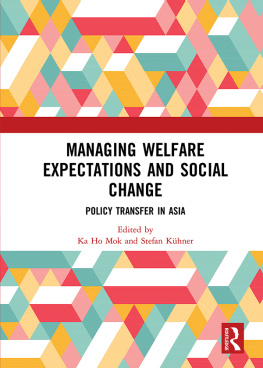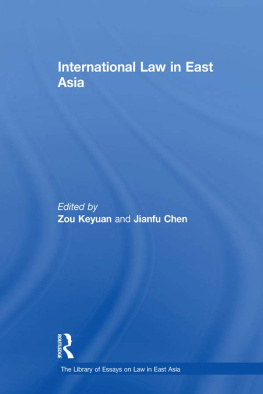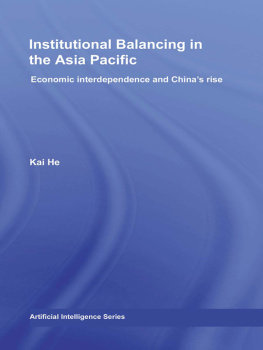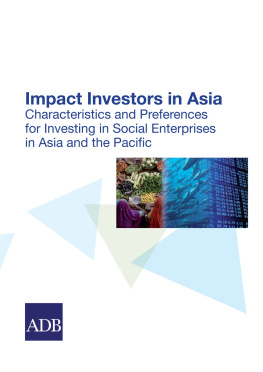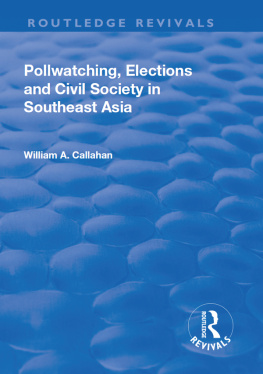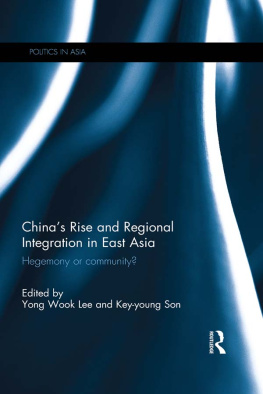ASIA-EUROPE COOPERATION AFTER THE 1997-1998 ASIAN TURBULENCE
Asia-Europe Cooperation after the 1997-1998 Asian Turbulence
Edited by
CHYUNGLY LEE
Institute of International Relations
National Chengchi University
Taipei, Taiwan, ROC
First published 2000 by Ashgate Publishing
Reissued 2018 by Routledge
2 Park Square, Milton Park, Abingdon, Oxon, OX 14 4RN
711 Third Avenue, New York, NY 10017, USA
Routledge is an imprint of the Taylor & Francis Group, an informa business
Copyright Chyungly Lee 2000
All rights reserved. No part of this book may be reprinted or reproduced or utilised in any form or by any electronic, mechanical, or other means, now known or hereafter invented, including photocopying and recording, or in any information storage or retrieval system, without permission in writing from the publishers.
Notice:
Product or corporate names may be trademarks or registered trademarks, and are used only for identification and explanation without intent to infringe.
Publishers Note
The publisher has gone to great lengths to ensure the quality of this reprint but points out that some imperfections in the original copies may be apparent.
Disclaimer
The publisher has made every effort to trace copyright holders and welcomes correspondence from those they have been unable to contact.
A Library of Congress record exists under LC control number: 00132829
ISBN 13: 978-1-138-72507-2 (hbk)
ISBN 13: 978-1-315-19207-9 (ebk)
Contents
Wen-jen Hsieh
Chyungly Lee
Christopher M. Dent
Elke Thiel
Wolfgang Pape
Gareth Api Richards
Chyungly Lee and Ya-chung Chang
Ya-chung Chang is an Associate Professor at the Institute of Asia-Pacific Studies, Nanhua University, Taiwan. He is the author of Issue of Sovereignty between Mainland China and Taiwan (1998); European Integration: Intergovernmentalism versus Supranationalism (1998); The German Question in International Law and Constitution (1999); America's China Policy: Containment, Engagement, Strategic Partnership (1999); Mainland China and Relations Across the Taiwan Strait (2000).
Christopher M. Dent is a Lecturer in Economics and Asian Studies at the University of Hull, UK. His main research interests concern foreign economic policy, the newly industrialising economies of East Asia, and EU-East Asia economic relations. He is the author of The European Economy: The Global Context (1997) and The European Union and East Asia: An Economic Relationship (1999), both published by Routledge.
Wen-jen Hsieh is an Associate Professor at the Graduate Institute of Political Economy, National Cheng Kung University, Tainan, Taiwan. Her publications have appeared in the following referred journals: Journal of Economics, International Economic Journal, Atlantic Economic Journal, Applied Economic Letters, and RISEC: International Review of Economics and Business. Her current research focuses mainly on the empirical investigations of economic development in East Asia, with a particular emphasis in China.
Chyungly Lee is an Associate Research Fellow at the Institute of International Relations, National Chengchi University, Taipei, Taiwan. Her current research centres mainly on issues of the economic and security nexus in the Asia-Pacific. Her most recent articles include conceptualisation of economic security, regional economic security in the Asia-Pacific, and the impact of East Asia financial crisis on regional economic and security cooperation. She is also associated with the establishment of the Council for Security Cooperation in the Asia-Pacific (CSCAP) in Taiwan.
Wolfgang Pape is in charge of External Relations, especially East Asia, at the Cellule de Prospective, a think tank advising the President of the European Commission. Previously he coordinated anti-dumping cases and served the EC as diplomat in Tokyo for six years. His publications cover mainly Europe as well as East Asia.
Gareth Api Richards is Hallsworth Junior Research Fellow at the Department of Government, University of Manchester, where he also teaches political economy of the Asia-Pacific. He is co-editor of Asia- Europe Interregionalism: Critical Perspectives, a special issue of The Journal of the Asia-Pacific Economy (1999). He is a member of the ASEM NGO working group.
Elke Thiel is a senior research associate at the Stiftung Wissenschaft und Politik, Research Institute for International Relations, Germany and lectures on European Politics at the University of Bamberg. Her research has focused on the political aspects of economic relations and European integration. Her numerous publications cover such topics as the G-7 cooperation, the transatlantic relationship, the European Monetary Union, and a comparative analysis on regional integration. She is the co-editor of Toward Rival Regionalism? U.S. and EU Regional Regulatory Regime Building (Nomos, 1998).
This book is a product of the joint efforts of several task forces. I would like to convey my deep appreciation to all of them.
First, the volume in part contains a selection of papers delivered at the 1998 Asia-Europe Cooperation Forum on Asian Turbulence: Challenges and Opportunities in Shaping New Regional and Interregional Order. The Conference was held from 1316 December 1998 in Taipei as part of a yearly Sino-European International Conference organised by the Institute of International Relations (IIR), National Chengchi University, Taipei, Taiwan. Each year, the Conference brings scholars from Europe and Asia together for intellectual discussion and cooperation on issues of common concern. As the Conference co-organiser of the Fifteenth Sino- European International Conference in 1998, I would like to thank all my colleagues in the Institute who worked on this conference. Without such collective effort, the Conference would never have come to such a fruitful conclusion.
Secondly, my gratitude goes to all the contributors of this volume, particularly those invited after the Conference, for their cooperation and commitment throughout the endeavour. Thanks also go to the commentators in the Conference and reviewers of the revised manuscripts for the book. All their constructive comments and suggestions substantially enrich this volume.
Finally, I would like to pay special tribute to several individuals who played important roles in achieving this book project. Many thanks to Dr. Yu-ming Shaw, the former Director of the IIR, and Dr. Szu-yin Ho, the current Director, for their support throughout the preparation for the Conference and the book; Dr. Fu-Kuo Liu, the Conference co-organiser, for his deep thoughts on the Conference themes and programme; Marian Lou, an intern from Stanford University, for her efforts in editing and tackling all the details; and mostly Dr. Yeong-Jeong Ou for his endeavours in every crucial aspect that brought success to this project.
When the first Asia-Europe Meeting (ASEM) took place in Bangkok in March 1996, economic relations between Asia and Europe were the assemblys main focus. Scholars and policy makers held the strong belief that the East Asian economic miracles would make Pacific Asia the most viable region in world affairs in the twenty-first century. When the second Asia-Europe Meeting resumed in London in April 1998, the EUs economic motivation of building strong links with Asia was challenged by the on-going Asian economic crises that broke out in mid-1997. The political and social turmoil that ensued in many East Asian economies not only urges a reexamination of the East Asian economic miracle, but also reprioritises the regional agenda and thus embarks on a new environment for Asia-Europe cooperation. The impact of this Asian turbulence on the establishment of the long-term Asia-Europe equal partnership in general and the ASEM process in particular are addressed in this book, based upon the conclusions of


